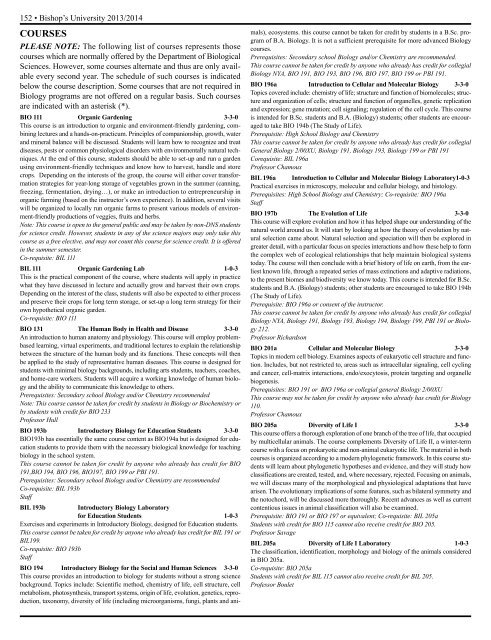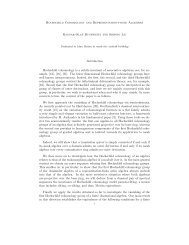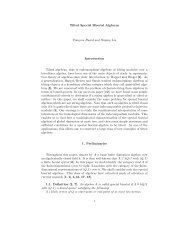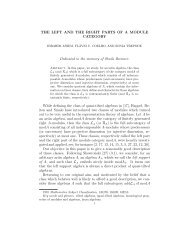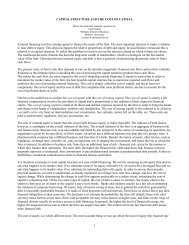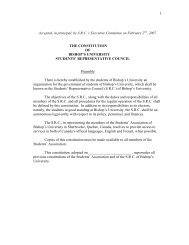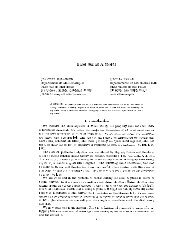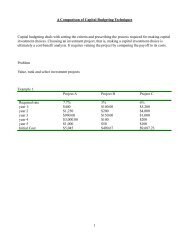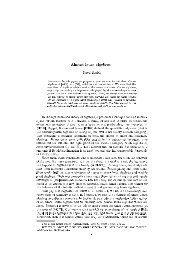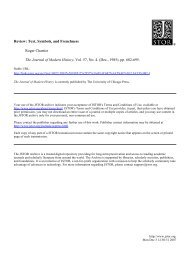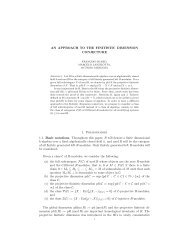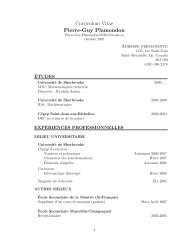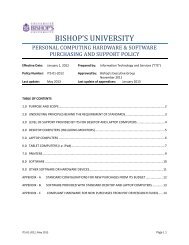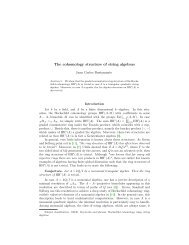Biological Sciences - Bishop's University
Biological Sciences - Bishop's University
Biological Sciences - Bishop's University
You also want an ePaper? Increase the reach of your titles
YUMPU automatically turns print PDFs into web optimized ePapers that Google loves.
152 • Bishop’s <strong>University</strong> 2013/2014<br />
COURSES<br />
PLEASE NOTE: The following list of courses represents those<br />
courses which are normally offered by the Department of <strong>Biological</strong><br />
<strong>Sciences</strong>. However, some courses alternate and thus are only available<br />
every second year. The schedule of such courses is indicated<br />
below the course description. Some courses that are not required in<br />
Biology programs are not offered on a regular basis. Such courses<br />
are indicated with an asterisk (*).<br />
BIO 111 Organic Gardening 3-3-0<br />
This course is an introduction to organic and environment-friendly gardening, combining<br />
lectures and a hands-on-practicum. Principles of companionship, growth, water<br />
and mineral balance will be discussed. Students will learn how to recognize and treat<br />
diseases, pests or common physiological disorders with environmentally natural techniques.<br />
At the end of this course, students should be able to set-up and run a garden<br />
using environment-friendly techniques and know how to harvest, handle and store<br />
crops. Depending on the interests of the group, the course will either cover transformation<br />
strategies for year-long storage of vegetables grown in the summer (canning,<br />
freezing, fermentation, drying…), or make an introduction to entrepreneurship in<br />
organic farming (based on the instructor’s own experience). In addition, several visits<br />
will be organized to locally run organic farms to present various models of environment-friendly<br />
productions of veggies, fruits and herbs.<br />
Note: This course is open to the general public and may be taken by non-DNS students<br />
for science credit. However, students in any of the science majors may only take this<br />
course as a free elective, and may not count this course for science credit. It is offered<br />
in the summer semester.<br />
Co-requisite: BIL 111<br />
BIL 111 Organic Gardening Lab 1-0-3<br />
This is the practical component of the course, where students will apply in practice<br />
what they have discussed in lecture and actually grow and harvest their own crops.<br />
Depending on the interest of the class, students will also be expected to either process<br />
and preserve their crops for long term storage, or set-up a long term strategy for their<br />
own hypothetical organic garden.<br />
Co-requisite: BIO 111<br />
BIO 131 The Human Body in Health and Disease 3-3-0<br />
An introduction to human anatomy and physiology. This course will employ problembased<br />
learning, virtual experiments, and traditional lectures to explain the relationship<br />
between the structure of the human body and its functions. These concepts will then<br />
be applied to the study of representative human diseases. This course is designed for<br />
students with minimal biology backgrounds, including arts students, teachers, coaches,<br />
and home-care workers. Students will acquire a working knowledge of human biology<br />
and the ability to communicate this knowledge to others.<br />
Prerequisites: Secondary school Biology and/or Chemistry recommended<br />
Note: This course cannot be taken for credit by students in Biology or Biochemistry or<br />
by students with credit for BIO 233<br />
Professor Hull<br />
BIO 193b Introductory Biology for Education Students 3-3-0<br />
BIO193b has essentially the same course content as BIO194a but is designed for education<br />
students to provide them with the necessary biological knowledge for teaching<br />
biology in the school system.<br />
This course cannot be taken for credit by anyone who already has credit for BIO<br />
191,BIO 194, BIO 196, BIO197, BIO 199 or PBI 191.<br />
Prerequisites: Secondary school Biology and/or Chemistry are recommended<br />
Co-requisite: BIL 193b<br />
Staff<br />
BIL 193b Introductory Biology Laboratory<br />
for Education Students 1-0-3<br />
Exercises and experiments in Introductory Biology, designed for Education students.<br />
This course cannot be taken for credit by anyone who already has credit for BIL 191 or<br />
BIL199.<br />
Co-requisite: BIO 193b<br />
Staff<br />
BIO 194 Introductory Biology for the Social and Human <strong>Sciences</strong> 3-3-0<br />
This course provides an introduction to biology for students without a strong science<br />
background. Topics include: Scientific method, chemistry of life, cell structure, cell<br />
metabolism, photosynthesis, transport systems, origin of life, evolution, genetics, reproduction,<br />
taxonomy, diversity of life (including microorganisms, fungi, plants and animals),<br />
ecosystems. this course cannot be taken for credit by students in a B.Sc. program<br />
of B.A. Biology. It is not a sufficient prerequisite for more advanced Biology<br />
courses.<br />
Prerequisites: Secondary school Biology and/or Chemistry are recommended.<br />
This course cannot be taken for credit by anyone who already has credit for collegial<br />
Biology NYA, BIO 191, BIO 193, BIO 196, BIO 197, BIO 199 or PBI 191.<br />
BIO 196a Introduction to Cellular and Molecular Biology 3-3-0<br />
Topics covered include: chemistry of life; structure and function of biomolecules; structure<br />
and organization of cells; structure and function of organelles, genetic replication<br />
and expression; gene mutation; cell signaling; regulation of the cell cycle. This course<br />
is intended for B.Sc. students and B.A. (Biology) students; other students are encouraged<br />
to take BIO 194b (The Study of Life).<br />
Prerequisite: High School Biology and Chemistry<br />
This course cannot be taken for credit by anyone who already has credit for collegial<br />
General Biology 2/00XU, Biology 191, Biology 193, Biology 199 or PBI 191<br />
Corequisite: BIL 196a<br />
Professor Chamoux<br />
BIL 196a Introduction to Cellular and Molecular Biology Laboratory1-0-3<br />
Practical exercises in microscopy, molecular and cellular biology, and histology.<br />
Prerequisites: High School Biology and Chemistry; Co-requisite: BIO 196a<br />
Staff<br />
BIO 197b The Evolution of Life 3-3-0<br />
This course will explore evolution and how it has helped shape our understanding of the<br />
natural world around us. It will start by looking at how the theory of evolution by natural<br />
selection came about. Natural selection and speciation will then be explored in<br />
greater detail, with a particular focus on species interactions and how these help to form<br />
the complex web of ecological relationships that help maintain biological systems<br />
today. The course will then conclude with a brief history of life on earth, from the earliest<br />
known life, through a repeated series of mass extinctions and adaptive radiations,<br />
to the present biomes and biodiversity we know today. This course is intended for B.Sc.<br />
students and B.A. (Biology) students; other students are encouraged to take BIO 194b<br />
(The Study of Life).<br />
Prerequisite: BIO 196a or consent of the instructor.<br />
This course cannot be taken for credit by anyone who already has credit for collegial<br />
Biology NYA, Biology 191, Biology 193, Biology 194, Biology 199, PBI 191 or Biology<br />
212.<br />
Professor Richardson<br />
BIO 201a Cellular and Molecular Biology 3-3-0<br />
Topics in modern cell biology. Examines aspects of eukaryotic cell structure and function.<br />
Includes, but not restricted to, areas such as intracellular signaling, cell cycling<br />
and cancer, cell-matrix interactions, endo/exocytosis, protein targeting and organelle<br />
biogenesis.<br />
Prerequisites: BIO 191 or BIO 196a or collegial general Biology 2/00XU<br />
This course may not be taken for credit by anyone who already has credit for Biology<br />
110.<br />
Professor Chamoux<br />
BIO 205a Diversity of Life I 3-3-0<br />
This course offers a thorough exploration of one branch of the tree of life, that occupied<br />
by multicellular animals. The course complements Diversity of Life II, a winter-term<br />
course with a focus on prokaryotic and non-animal eukaryotic life. The material in both<br />
courses is organized according to a modern phylogenetic framework. In this course students<br />
will learn about phylogenetic hypotheses and evidence, and they will study how<br />
classifications are created, tested, and, where necessary, rejected. Focusing on animals,<br />
we will discuss many of the morphological and physiological adaptations that have<br />
arisen. The evolutionary implications of some features, such as bilateral symmetry and<br />
the notochord, will be discussed more thoroughly. Recent advances as well as current<br />
contentious issues in animal classification will also be examined.<br />
Prerequisite: BIO 191 or BIO 197 or equivalent; Co-requisite: BIL 205a<br />
Students with credit for BIO 115 cannot also receive credit for BIO 205.<br />
Professor Savage<br />
BIL 205a Diversity of Life I Laboratory 1-0-3<br />
The classification, identification, morphology and biology of the animals considered<br />
in BIO 205a.<br />
Co-requisite: BIO 205a<br />
Students with credit for BIL 115 cannot also receive credit for BIL 205.<br />
Professor Boulet


